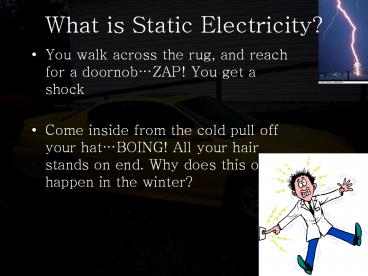What is Static Electricity? - PowerPoint PPT Presentation
Title:
What is Static Electricity?
Description:
What is Static Electricity? You walk across the rug, and reach for a doornob ZAP! You get a shock Come inside from the cold pull off your hat BOING! – PowerPoint PPT presentation
Number of Views:124
Avg rating:3.0/5.0
Title: What is Static Electricity?
1
What is Static Electricity?
- You walk across the rug, and reach for a
doornobZAP! You get a shock - Come inside from the cold pull off your
hatBOING! All your hair stands on end. Why does
this only happen in the winter?
STATIC ELECTRICITY
2
Cartoon of the Day
3
Static Electricity
- The result of a buildup or stealing of electrons.
- (a negative charge)
4
First a little about the nature of Matter
- Imagine dividing a pure gold ring in half
- Keep one half and give the other away
- Divide your half again and give half away
- Keep doing this and eventually you wouldnt be
able to divide it anymore - GOLD ATOM
5
Parts of an Atom
- In the center of each atom is a NUCLEUS
- Contains 2 particles
- PROTONS
- NEUTRONS
- Orbiting around the nucleus are smaller particles
called ELECTRONS
6
Atom
- Useful to think of the Atom as a solar system
- The Nucleus is like the sun
- The Electrons are like planets orbiting the sun
- Just like the Sun the Nucleus is large compared
to the orbiting electrons
7
Electrical Charges
- Protons, Electrons, Neutrons each have their own
properties - Electrons have a negative charge (-)
- Protons have a positive charge ()
- Neutrons have no charge or are neutral
- Protons have a charge that is exactly opposite
and equal to that of Electrons
8
Electrons can Move!
- Protons and Neutrons are held together very
tightly in the Nucleus - Some of the OUTER Electrons in atoms can move
from one atom to the other - Normally Atoms have no charge
9
Electrons can Move!
- When an Atom receives extra electrons it GAINS
MORE NEGATIVE CHARGES - Thus becomes negative (-)
- When an Atom loses electrons it GAINS MORE
POSITIVE CHARGES - Thus becomes Positive ()
10
- Charged particles exist in atoms.
- Electrons are responsible
- for negative charge
- protons for positive charge
- neutrons have no charge.
- Small amounts of ordinary matter contain
- incredible amounts of subatomic particles!
11
Insulators
- Some materials hold very tightly to their
electrons - Electrons dont move very well through these
materials Insulators
Insulator material through which charges will not
easily move
link
12
Conductors
- Some materials have loosely held electrons
- Electrons move very well through these materials
Conductors
Conductor material that allows charges to move
about easily
link
13
Good Conductors Fair Conductors Insulators
Aluminum Silicon Amber
Copper Carbon Cotton
Gold Earth Ebonite
Iron Human Body Fur
Magnesium Humid Air Glass
Mercury Water (salty) Paper
Nickel Plastic
Platinum Porcelain
Silver Rubber
Tungsten Silk
Sulfer
Water (Pure
Wood
Wool
14
Opposites Attract
- Positive and Negative Charges behave in
interesting ways! - Two things with opposite (positive and negative)
charges will attract each other - Two thing with similar charge (2 positive, or 2
negative) will push each other away
15
Charged objects
- Charged objects will also attract neutral objects
- Eg rubbing a balloon in your hair creates a
charge on the balloon - It will then be attracted to a neutral wall
16
- So on a bad hair day all the hair on your head
has the same charge and they all repel each other.
17
Website of the Day
- See if you can determine what factors are
required to create an electrical circuit. - http//www.mhhe.com/physsci/physical/giambattista/
circuits/circuits.html
18
Bonus
- What is the difference between Series and
Parallel Circuits? - What is the Difference between AC and DC current
electricity? (Alternating Current, Direct
Current) - What is the Difference between Static and Current
Electricity?































